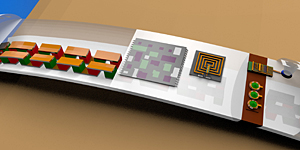By Kalwinder KaurSep 7 2012
The National Science Foundation declared that North Carolina State University will direct a national nanotechnology research initiative that focuses on developing self-powered health monitoring devices.
 Self powered health monitoring device
Self powered health monitoring device
Intended to be based on NC State’s Centennial Campus, The NSF Nanosystems Engineering Research Center for Advanced Self-Powered Systems of Integrated Sensors and Technologies (ASSIST) is a combined effort between NC State and partner institutions viz., the University of Virginia, Pennsylvania State University and Florida International University. Supported with initial five-year $18.5 M grant from NSF, the center’s global research consortium comprises of five affiliated universities and 30 industry partners.
The establishment of ASSIST has made NC State to be the country’s unique institution to lead two active NSF Engineering Research Centers (ERCs). The 2008-established FREEDM Systems Center, a smart grid ERC is also based at NC State.
Using small materials, ASSIST researchers will create self-powered health monitoring sensors and devices that can be attached to different parts of the body.
With rapid growth in wireless health monitoring, ASSIST’s self-powered technology revolutionizes the use of battery-driven devices. With power driven from nanomaterials and nanostructures as well as body heat and motion-based thermoelectric and piezoelectric materials, ASSIST researchers intend creating devices that can work using low amounts of energy.
Data collected from research studies conducted based on such devices will be of critical importance to lawmakers creating environmental policy. These devices will also bring down the national health care costs ( $2.5 Tn in 2010).
The center’s HQ will be located at the Larry K. Monteith Engineering Research Center on NC State’s Centennial Campus. ASSIST researchers will create thermoelectric materials that monitor body heat and will also develop new nanosensors that can collect health information. Such technology will then be incorporated within wearable devices.
Penn State researchers will develop energy-efficient transistors and new piezoelectric materials. University of Virginia researchers will create means to operate the systems using low power, while Florida International University will develop sensors that can collect biochemical signals.
The culmination of work will support the processing of health data collected by the sensors and its transmission to computers and consumer devices.
The five-year NSF grant for ASSIST can be renewed for five more years.
Disclaimer: The views expressed here are those of the author expressed in their private capacity and do not necessarily represent the views of AZoM.com Limited T/A AZoNetwork the owner and operator of this website. This disclaimer forms part of the Terms and conditions of use of this website.